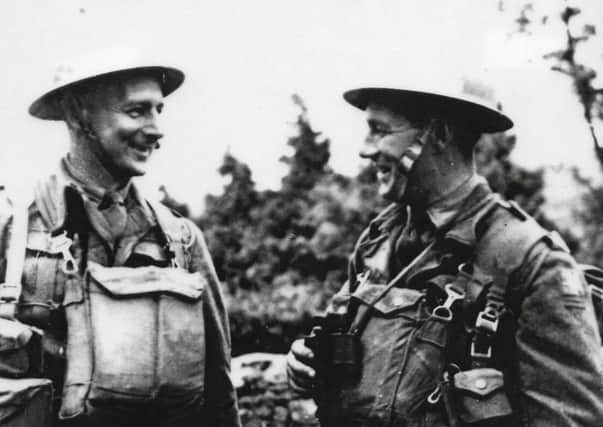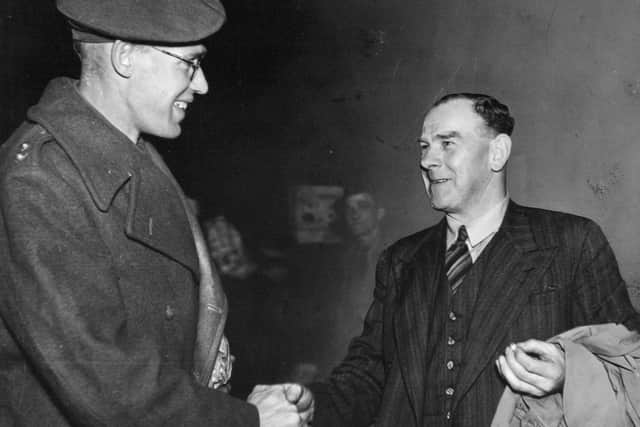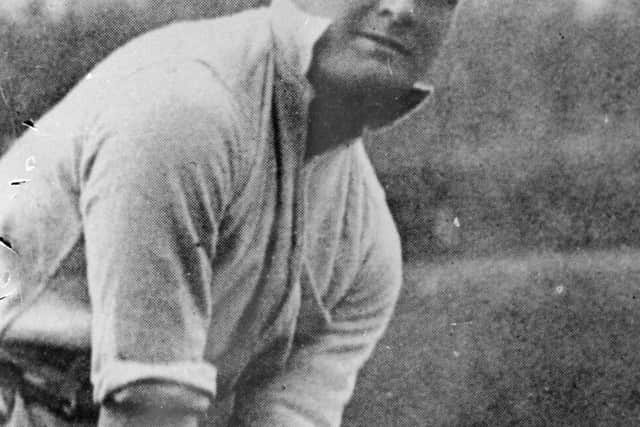How cricket lifted morale of a nation during two world wars


“I had the feeling that if Goebbels had been able to broadcast that the war had stopped cricket at Lord’s, it would have been valuable propaganda for the Germans,” declared the former England captain/administrator.
And so cricket did continue.
Not only at headquarters, where many morale-boosting and money-spinning charity matches were organised, but throughout the country – not least in Yorkshire in the local leagues.
Advertisement
Hide AdAdvertisement
Hide Ad

Many Test and county players turned out in the Bradford league, for example, which helped to plug the gap for cricketers and spectators denied their fix of first-class competition, silenced for six years by Hitler’s bombs.
It was a similar story in World War One.
Although first-class cricket ground to a halt (although not immediately, as Yorkshire played nine more first-class games after Britain declared war at the start of August, 1914 until the season concluded in early September), the club game continued in the background.
It was one of the more obvious ways of maintaining a semblance of normality and, felt many, it was what our brave servicemen on the front would have wanted.


If cricket, that most quintessential of English pastimes should stop, why... one might as well have raised the white flag to Wilhelm and co.
Advertisement
Hide AdAdvertisement
Hide AdHow ironic, therefore, that the dreaded coronavirus has done what two of the costliest conflicts in human history were unable to do – stop play.
The county season will not now start until May 28 at the earliest (we can probably add at least a couple of months on to that, you would think), and the recreational game is also in abeyance.
At times like this, many are confronting the question – does sport matter? Clearly not when set against the overriding issues of life and death. Clearly yes in terms of filling a void that is presently missing from so many lives.
The question as to whether cricket should continue was greatly debated during World War One.
Advertisement
Hide AdAdvertisement
Hide AdAs grim dispatches arrived from the continent, where millions were slaughtered in a much graver game, some thought it entirely inappropriate for cricket to proceed even at club level, and many Yorkshire clubs closed as a result.
Others, though, viewed it as a welcome diversion and a way of keeping men physically and mentally fit for the military effort.
There was also a desire to provide those who worked in the munitions factories, for instance, with much-needed entertainment; ergo, a delicate balancing act had to be observed.
Although Yorkshire played no county cricket between early September, 1914 and late May, 1919, the club supported the war effort in several ways.
Advertisement
Hide AdAdvertisement
Hide AdThe club offices and staff were made available to the headquarters of the West Riding Volunteer Regiment, and some Yorkshire players used their profile to assist with recruitment – not least Major Booth, Arthur Dolphin and Roy Kilner of the Leeds Pals (tragically, Major Booth was among those killed in action on the Western Front).
Yorkshire sent out around 500 parcels of cricketing materials to military camps at home and abroad, and they also helped arrange many fundraising games.
They were superbly supported by their loyal members, many of whom continued to send in their subscriptions to help with the upkeep of the club’s various venues.
The same thing happened during World War Two, when county grounds were often commandeered by the authorities. The grounds were sitting targets, of course, with Sheffield’s Bramall Lane bombed in 1940.
Advertisement
Hide AdAdvertisement
Hide AdAlthough many top players continued to play Yorkshire league cricket in World War Two, most of the Yorkshire CCC staff went into the Forces.
Bill Bowes, Hedley Verity, Brian Sellers, Maurice Leyland, Len Hutton and Norman Yardley were just some of the players who swapped their whites for military garb.
Verity, alas, was another high-profile casualty – killed in Italy in 1943. His last reported words said it all: “Keep going.”
Four years earlier, in September, 1939, Verity starred in the final first-class game in England before the Second World War. The left-arm spinner took 7-9 to help Yorkshire to a nine-wicket win.
Advertisement
Hide AdAdvertisement
Hide AdOnce again, the question of whether it was right to be playing cricket prevailed.
Indeed, on the very day of Verity’s tour de force, the news came through that Germany had invaded Poland, making war certain.
Lancashire’s match against Surrey at Old Trafford was immediately abandoned, and all county games due to start the following day were called off.
The Yorkshire committee wired to Brian Sellers, the club captain, to suggest that the fixture at Hove was called off, too, but as it was a benefit match for Sussex’s Jim Parks, he replied that the players would like to continue if possible.
Advertisement
Hide AdAdvertisement
Hide Ad“The tension was awful,” recalled the Sussex batsman George Cox.
“There was a feeling that we shouldn’t be playing cricket, yet there was also a festive air.
“We knew that this was to be our last time of freedom for many years and so we enjoyed ourselves while we could.”
With all long-distance train services cancelled, Sellers and his players had to find alternative transport back to Yorkshire.
Advertisement
Hide AdAdvertisement
Hide AdA green Southdown coach was arranged, and the great JM Kilburn, the former Yorkshire Post cricket correspondent, travelled with the team.
“The anxiety of the uncertain hung heavily in the air,” he wrote.
“Scarcely anyone mentioned cricket, though the past few days had brought cricket of uncommon quality.”
An experimental blackout had been ordered throughout the country that night, and, instead of driving through the darkness, the team overnighted in Leicester.
Advertisement
Hide AdAdvertisement
Hide Ad“The journey was to be continued soon after dawn,” added Kilburn. “In any event there was little sleep.
“Half the night was spent in awaiting delayed telephone calls to explain revised arrangements, and before eight o’clock on the Saturday morning Yorkshire were in Yorkshire again.”
Kilburn continued: “Halts began, one passenger dropping off here, another there.
“Finally came journey’s end in City Square, Leeds, and thence departed their several ways one of the finest county teams in the history of cricket.
“It never assembled again.”